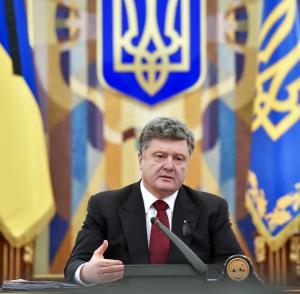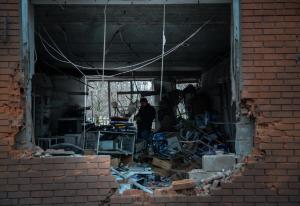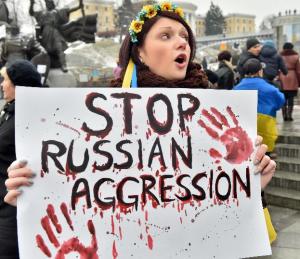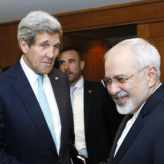Obama ramps up pressure on Russia after deadly Ukraine blitz
People set candles and lay flowers at Independence Square in Kiev on January 25, 2015, during a rally …
Kiev (AFP) - US President Barack Obama vowed Sunday to ramp up pressure on Russia after a rocket barrage blamed on Kremlin-backed Ukrainian rebels killed 30 and threatened to open new front in the war.
Saturday's assault on Mariupol -- the main city standing between separatist territory near the Russian border and the Black Sea peninsula of Crimea that Moscow annexed in March -- came a day after the insurgents pulled out of peace talks and vowed to capture new land.
Ukrainian President Petro Poroshenko told an emergency security meeting that Kiev had intercepted calls proving the attack was masterminded "by terrorists who receive support in Russia".
Obama said he would now look at all options -- short of military intervention -- to restrain Russian President Vladimir Putin's alleged proxy war aimed at stripping Ukraine's pro-Western leaders of their vital eastern industrial base.
He pledged to "ratchet up the pressure on Russia" and signalled that he took a dim view of some EU members' desire to revive their ailing economies by restoring full financial and trade ties with sanctions-hit Moscow.
"If Mr Putin and if Russia are hell-bent on engaging in military conflicts, their military is more powerful than Ukraine's," Obama said during a visit to India.
"The question is going to be whether they continue to pursue a path that not only is bad for the people of Ukraine, but is... bad for the people of Russia."
New European Council President Donald Tusk -- a former Polish prime minister who had long been suspicious of Putin -- also called the Mariupol attack evidence that "appeasement encourages the aggressor to greater acts of violence.
"Time to step up our policy based on cold facts, not illusions," Tusk tweeted.
French President Francois Hollande meanwhile expressed his "very strong concern" over the Mariupol violence in talks with Poroshenko and Tusk.
- 'Like an earthquake' -
The Kremlin flatly denies arming and funding the militants, as the West alleges. Russian Foreign Minister Sergei Lavrov on Sunday blamed the latest upsurge in violence on "constant shelling" by Kiev's troops.
"Lavrov pointed out that an escalation of the situation is a result of Ukrainian troops crudely violating the Minsk agreements by constantly shelling residential settlements," the foreign ministry said after Russia's top diplomat spoke to US Secretary of State John Kerry by phone.
Poroshenko told his top generals that he had asked the European Union to tighten their sanctions on Russia at a special session of foreign ministers scheduled to be held in Brussels on Thursday.
The Western-backed leader -- looking tired after cutting short his attendance at the burial of the late Saudi king -- also insisted that the attack would not provoke Kiev into ordering a tough military response.
"Ukraine remains a firm proponent of a peaceful solution," he told a televised meeting of his National Security and Defence Council.
Regional police said 95 people were also wounded by dozens of long-distance rockets that smashed into a packed residential district and a market in Mariupol on Saturday.
"I was alone at my house when the shelling began," a boy named Viktor Zarubin told AFP outside a Mariupol church that was having a mass for the victims of the surprise offensive.
"I lay down on the ground and I crawled into the basement. It was like an earthquake,' the 15-year-old said.
The self-proclaimed Donetsk People's Republic leader Alexander Zakharchenko claimed Saturday that "today we launched an offensive against Mariupol".
He later distanced himself from the rocket fire and denied ordering an actual invasion of the industrial port on the Sea of Azov.
But the Organization for Security and Cooperation in Europe (OSCE) said the Grad and Uragan rocket fire came from two locations "controlled by the 'Donetsk People's Republic'".
- 'Infusion of Russian troops' -
Mariupol remained calm on Sunday as international monitors patrolled its muddied streets.
The bustling city is home to two of Ukraine's largest smelters and most of the southeast's vital coal and steel exports go through its docks.
A rebel assault on the port in early September saw Kiev repel the attack at a heavy cost that prompted Poroshenko to pursue peace and offer the rebels three years of limited self-rule.
But the ceasefire was followed by further clashes that killed at least 1,500 people. Combat resumed in full in mid-January after a three-week lull.
Western diplomats have linked the rebel advance to a new infusion of Russian troops -- denied by the Kremlin -- designed to expand separatist territory before the signing of a final truce and land demarcation agreement.
Ukraine claimed Monday that Moscow had poured nearly 1,000 more Russian soldiers and dozens of tanks into the southeast to secure control over factories and coal mines that could help the rebels build their own state.
"Taking Mariupol is a first step to a broader offensive. It is also an end in itself, anchoring the southern flank in the city," the US-based Stratfor global intelligence company warned in a "red alert" issued to clients.
Recommended for You
Iran's foreign minister summoned to parliament over walk with Kerry
Iranian Foreign Minister Mohammad Javad Zarif is to appear before parliament following controversy over a promenade with his American counterpart during intense nuclear negotiations in Geneva, state media reported on Sunday. Zarif, who leads Tehran's talks with "P5+1" - the United States, Britain,…ReutersIS claims it executed Japanese hostage
The Islamic State group said Sunday it executed one of two Japanese hostages it has been holding, in an apparent beheading branded "outrageous and unforgivable" by Japanese Prime Minister Shinzo Abe. The claim comes a day after the release of a video announcing the murder of security contractor…









No comments:
Post a Comment
Please leave a comment-- or suggestions, particularly of topics and places you'd like to see covered